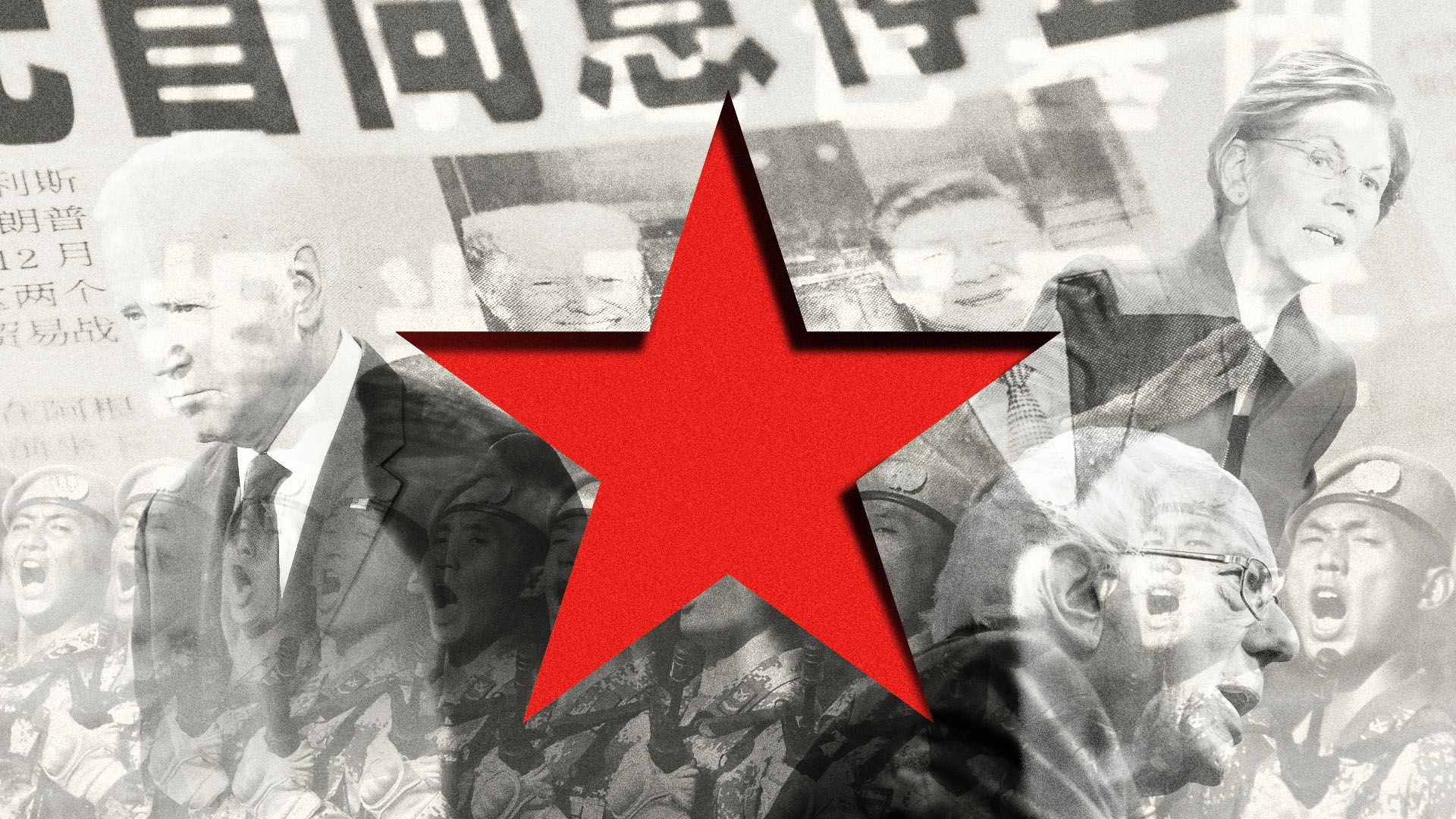The China challenge stumps the 2020 candidates
Add Axios as your preferred source to
see more of our stories on Google.

Photo Illustration: Sarah Grillo/Axios. Photos: Scott Eisen/Getty Images, Justin Sullivan/Getty Images, Naohiko Hatta - Pool/Getty Images, and Greg Baker/AFP via Getty Images
Most U.S. presidential candidates identify China as a serious national security challenge, but they're short on details as to how they'd tackle the economic, technological and human rights threats posed by the world’s largest authoritarian power.
Why it matters: The Chinese Communist Party is seeking to reshape the world in its own image and amass enough power to marginalize the United States and Western allies regardless of whether China is contending with President Trump for another four years — or one of his Democratic rivals.
Details: Under Xi Jinping, China is leveraging economic ties as one of the world’s top traders to counter U.S. foreign policy goals.
- It's setting global standards in telecommunications and surveillance technology, giving Beijing far-reaching power over data and privacy.
- It's weakening human rights standards. In October, after ambassadors from 23 UN countries backed a statement denouncing the cultural genocide in Xinjiang, 54 countries came to China’s defense.
- China constrains free speech even inside the United States. It has successfully muted criticism of its policies among leading U.S. companies, institutions and even Hollywood.
Trump has alternated between confronting and appeasing Beijing.
- He's demanded that Beijing adopt trade policies that reduce the U.S. trade deficit with China and support U.S. manufacturing.
- He's filled his administration with China hawks, and the FBI is taking on Chinese intellectual property theft at U.S. institutions.
- But Trump has also pursued policies that give China a competitive edge in Asia and elsewhere, and he shied away from condemning human rights violations.
What they're saying: The Democratic presidential candidates have mostly argued that strengthening American democracy at home and recommitting to allies abroad is the best way to respond to China, while rejecting the administration's approach. But they've largely stuck to vague pronouncements rather than enumerating specific policies.
Joe Biden wants to restore a pre-Trump traditionalist foreign policy.
- Biden's July foreign policy speech focused largely on reversing what he considers the foreign policy mistakes of the Trump era. He has advocated shifting naval power to Asia.
- His plans represent a traditionalist foreign policy paradigm, where U.S. pronouncements, supported by allies and military power, change the behavior of state and non-state actors. He wants U.S. technology companies to make “pledges” to uphold ethics and privacy in business with China.
Elizabeth Warren prescribes multilateralism and better economic policies to counter China’s authoritarianism.
- As a senator, Warren has signed her name to numerous letters calling out China’s human rights violations and attempts to curtail criticism in U.S. media and academia. But as a candidate, she rarely talks about China.
- "Elizabeth favors a strategy of engagement with China where our interests align, including on critical security issues like climate change and counter-proliferation," a Warren campaign spokesperson told Axios in a statement. "But she will not hesitate to push back in areas where we disagree, including China's growing human rights abuses, unfair economic practices that harm American workers, and efforts to undermine global norms."
Pete Buttigieg characterizes the nature of the China challenge as the “international expansion of authoritarian capitalism."
- Buttigieg has identified political interference, proxy wars, cyberattacks, and the potential weaponization of economic and technological interdependence as among China’s most troubling tools of wielding influence.
- But his proposals tend to be vague: maintain a strong military, strengthen American society and “invest in strategies to deal with less overt threats,” without detailing those strategies.
Andrew Yang is a one-issue candidate when it comes to China: technology.
- “The world order in the 21st century will be defined by the relationship between the United States and China around technology, from artificial intelligence (AI) and data, to quantum computing and 5G technologies,” Yang's campaign told Axios in a statement.
- When asked about China in the Dec. 19 debate, his approach was to "build an international coalition to set technology standards, and then you can bring the Chinese to the table in a very real way, because this is their top priority, and this is where we need to outcompete them and win.”
Bernie Sanders has said it is "absolutely possible for us to have a positive working relationship with China," and he has detailed plans to revamp the U.S.-China economic relationship to improve the lives of American workers.
- Sanders said China has "more progress in addressing extreme poverty than any country in the history of civilization."
- But he's acknowledged China’s turn toward authoritarianism, enshrined human rights as a pillar of his foreign policy and supported measures to restrict China's military buildup.
Michael Bloomberg has praised top Chinese officials and pressed for engagement with China.
- Bloomberg has extensive business interests in China that could potentially pose major conflicts of interest if he became U.S. president, while his representatives say he will call out China on human rights violations and other abuses.
- He has said that President Xi is "not a dictator" and has referred to Chinese nationals as Xi's "constituents."
- "China’s systemic trade violations, including the theft of U.S. intellectual property and other anti-competitive practices, harm millions of American workers and would be a top priority of a Bloomberg administration," his campaign told Axios.
